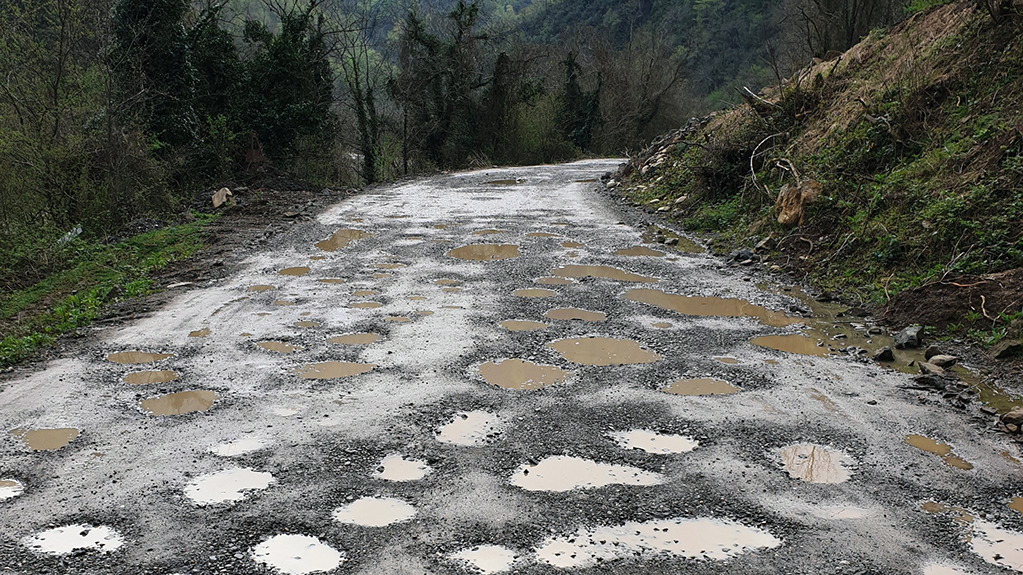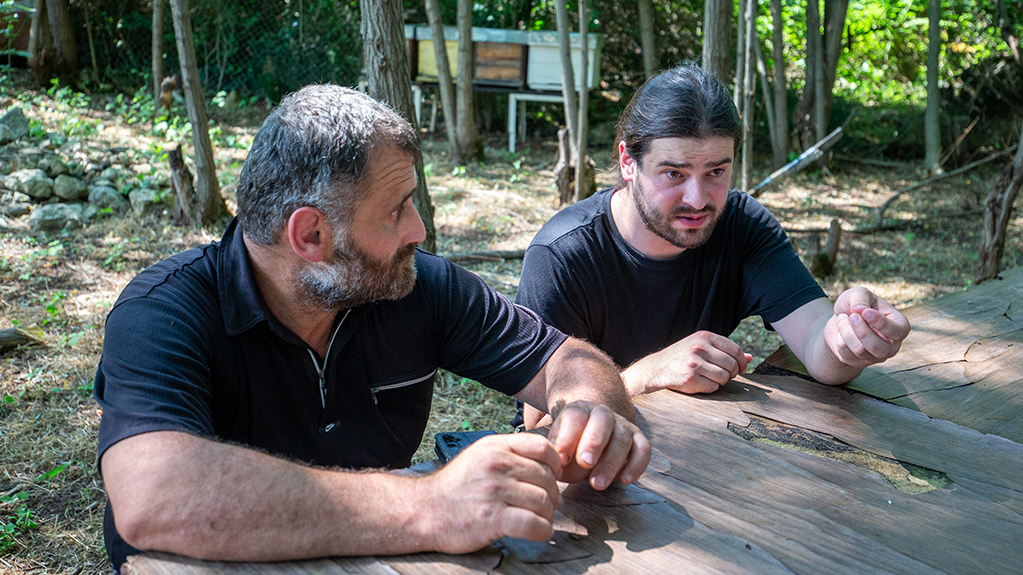"The Namakhvani HPP cascade construction project is the primary reason why the Rioni Valley road is not being built, and why the villages of Zemo Imereti and Lechkhumi are deliberately left off the map. The government believes that if fewer people remain in this valley, they will face fewer problems with the construction of the hydroelectric cascade if they attempt it again," said Varlam Goletiani. Along with other members of the Save the Rion Valley movement and local residents, he has been leading a protest in the village of Alpana for four months, demanding that the authorities organize a safe road - something the locals believe they have long deserved since the presidency of Zviad Gamsakhurdia.
News
The Kutaisi-Alpana-Mamisoni road, which passes through the villages of Tskaltubo and Tsageri, is used not only by residents of Imereti and Lechkhumi but also by those from Racha and Kvemo Svaneti. Passenger mini buses from Kutaisi, Oni, and Ambrolauri also travel this route. The road is short and runs alongside the Rioni River. It avoids the need to traverse the Nakerala or Shkmeri passes to reach Racha. Even in winter, it remains open and accessible, although it can be a nuisance for passengers and particularly bothersome for those living along the road, as the passing cars stir up dust that settles on the villages in the valley.
"Once any official boards and experiences this transport, they will see what is happening. It's truly hellish. There is no other way to describe it. When you finally get off, you feel as though you've eaten gravel. I won't even mention the shaking," Varlam Goletiani tells us.
In the village of Mekvena, even on hot summer days, rain is no longer a cause for joy. Houses and yards below the road, which have been without drainage channels for decades, are flooded with water from the gullies and from the road itself.
"If you are transporting a sick person, may God protect everyone, as you may not reach the city alive," says Maka Suladze, one of the three families in Mekvena who did not sell their houses to the Namakhvani HPP Cascade construction company in previous years. As a result of public protests, the massive hydroelectric project failed, and a large part of the valley was spared from flooding. Even those who sold their houses to the Enka company still live in the villages. However, Maka cites fear as one reason why the local population cannot actively demand the rehabilitation of the road: "The houses are no longer theirs, so they are careful not to ask for their eviction. While they are here, they maintain their plots, gardens, and grow produce."
Above Mekvena, in the Lechkhumi villages of Tvishi, Korenishi, and Orkhevi - an area renowned for Tsolikauri grapes and wine - more people have survived. Even those who have moved to Kutaisi try to maintain their parents' houses and vineyards, whether old or newly built, on weekends. This situation is a major problem for them.
Nugzar Godoladze, a resident of Korenishi, has his wife and children in Kutaisi, but he must travel to Lechkhumi and back several times a week. "I drive my children on this road with fear, worried that something might fall on us. It's prone to landslides, as you can see.
When a car drives ahead, the dust is so thick that I can't see anything, and I'm afraid I might veer off the road. I am risking my own safety, and lately, I've been taking my children less and less often."
Nugzar is also a participant in the action that has set up a tent in Alpana. They put up the tent because neither the local nor the central government has taken any action or even responded to whether the rehabilitation of the Rioni Valley road is planned.

Following this, members of the experienced Save the Rioni Valley movement blocked the Alpana road, where the government is constructing a large high-voltage distribution station. Four months into the protest, the situation remains unchanged - the local population will not allow trucks to access the high-voltage construction site until the full rehabilitation of the Rion Gorge road, which stretches 27 kilometers from Namakhvani, where the paved road ends, to Alpana, where the dirt road begins, is underway.
A month ago, the Racha-Lechkhumi-Kvemo Svaneti governor's administration announced that the highway department would soon begin rehabilitating the Kutaisi-Alpana-Mamisoni road (from the 22nd km to the 49th km). "The tender has already been completed. We are currently in the stage of submitting additional documentation, after which the contract will be signed," stated the governor's administration.
The tender, worth 80 million, was announced on June 12 and had only one participant, New Road LLC, which was declared the winner. According to the agreement, the company is responsible for roadworks on international and domestic highways in the Imereti, Racha-Lechkhumi, and Kvemo Svaneti regions. The contract does not specify which road department will oversee the company's tasks. The agreement is set to last until 2027, with "New Road" receiving 20 million this year, 30 million for Gais, 20 million in 2026, and the remaining 10 million in 2027.
The Department of Roads has not clarified when the rehabilitation of the Rioni Valley road will commence. If progress is not made soon, the local population may seek a court order to ensure the creation of a safe road.
In 2020, the Buba River embankment protection project in the Shove resort area was awarded to New Road without a tender. The company subsequently hired the inexperienced B.P. Trans, owned by Bichiko Paikidze, a Vani City Council member from Georgian Dream and the godfather of Grigol Liluashvili, head of the State Security Service. The company was tasked with cleaning and deepening the riverbed and constructing dams with large stone boulders within two months. The deadline was extended, but the dam near the cottages was still not completed. On August 3, 2023, a flood occurred exactly where the dam had not been built, resulting in 33 fatalities. No one has been held responsible, and Paikidze was awarded a new project worth 21 million at the end of 2023.















